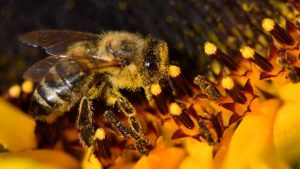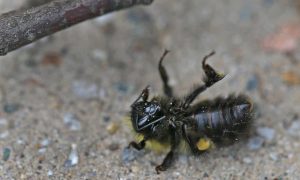
Beekeepers have reported the loss of over 500 million honey bees in the short time span of three months at the beginning of the year. The speed and scale of the loss is reminiscent of colony collapse disorder, which affected the bees of North America and Europe. However, where colony collapse disorder caused worker bees to leave the colony and never return, the bees in Brazil simply dropped dead, a symptom indicative of poisoning by pesticide (Hanson 2019). It has been argued that “the main cause of death for these bees has been the use of pesticides containing products that are banned in Europe, such as neonicotinoids and fipronil” (“Why 500 Million Bees Have Died in Brazil” 2019). The EU has imposed bans on neonicotinoids due to the harm they can cause bees; however, much like how the “relaxation of forestry rules has led to more fires, so have loosened pesticide restrictions exposed more bees to lethal doses” (Hanson 2019). Brazil relies on pesticides as their economy is almost entirely dependent on agriculture.
The massive bee die off is problematic not only with regards to the economy of Brazil but also to global food availability. Bee pollinated crops account for nearly a third of the food in the human diet, and “yields of everything from canola to soybeans drop in their absence, while fruits and nuts like blueberries and almonds depend upon them entirely” (Hanson 2019). Additionally, while people may only think of the typical honeybee when the word bee is mentioned, the same threats that affect honeybees also affect native wild bees which are also essential pollinators for many crops. Thus, “whenever domestic hives start failing, it signals a much broader problem in nature” (Hanson 2019).

The article concludes by arguing that many of the challenges affecting Brazil, with both its bees and forest, is poor policy. It also argues that in a democracy “government policy amounts to an expression of collective will” and that people should demand more from their leaders as well as themselves (Hanson 2019). In Brazil, there has been an increase in demand for organic food, which is reflected in a global trend for the same. Hanson argues that “it’s a reminder that how we buy food directly impacts the way that we grow it, and organic methods…support a far greater diversity of pollinators” (2019). Hanson ends with a call to arms to plant flowers as “pesticide-free sources of nectar and pollen can increase bee abundance in any habitat..and since well-fed bees are more resilient to other threats, flowers can even be a hedge against pesticides” (2019). He concludes that the first step to solving the crisis is noticing that it exists, and the second step is taking action to solve and prevent the problem.
While the title of the article makes it seem like Brazil will be the main focus of the article, the actual body of the article focuses more on the problem of bee population drop globally. The article mentions why Brazil specifically has seen such massive losses in bee population; however, it does not specifically mention how that has directly affected Brazil and its people or economy. It is interesting that the article mentions how global food availability and trade is affected by the drop in bee population, but it does not state how Brazil specifically contributes to the trade. It would have been more interesting if the article had gone into detail on how the drop in bee population has affected Brazil’s agriculture and from there how that may affect the food that is exported to other parts of the globe. It is also interesting to note that the author of the article, Thor Hanson, is also the author of Buzz: The Nature and Necessity of Bees. This may have affected how he wrote the article as he is more likely focused on the global issue of bee population depletion rather than how it affects a specific area.
This connects to the themes we have discussed in class regarding the economic structure of Latin America. Both readings and class discussions have discussed how many Latin American countries rely on agriculture as their main source of income. Thus, this article is important as it addresses a major threat to what may be the only source of income for some countries. This also connects to some of the themes we have discussed regarding government systems of Latin American countries. The article mentions how most of the bee loss is due to bad policy on behalf of the government. This connects to the themes of the class with regards to how these governments have been put into place and what factors have affected the way they are run in modern times.
References
Hanson, Thor. 2019. “Why Have 500 Million Bees Died in Brazil in the Past Three Months? | Thor Hanson.” The Guardian, August 29, 2019, sec. Opinion. https://www.theguardian.com/commentisfree/2019/aug/29/500-million-bees-brazil-three-months.
“Why 500 Million Bees Have Died in Brazil.” 2019. BBC News. August 20, 2019. https://www.bbc.com/news/newsbeat-49406369.
